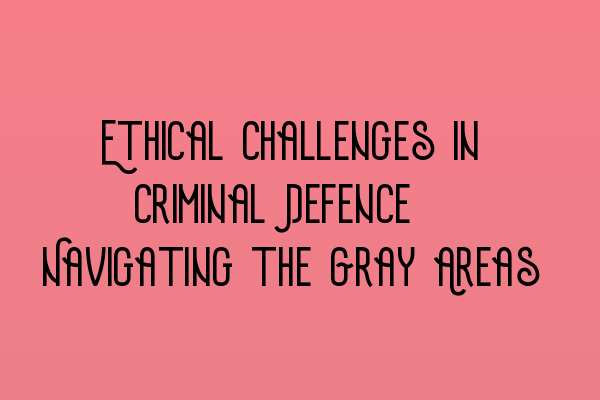Ethical Challenges in Criminal Defence: Navigating the Gray Areas
As criminal defence solicitors, we are faced with numerous ethical challenges in our daily practice. The nature of our work requires us to navigate the gray areas of the law, where ethical dilemmas often arise. In this blog post, we will explore some of the common ethical challenges faced by criminal defence solicitors and discuss strategies for ethically navigating these complex scenarios.
The Importance of Ethical Conduct
Before delving into specific challenges, it is crucial to emphasize the importance of ethical conduct in the field of criminal defence. Upholding high ethical standards is not only a requirement set by the Solicitors Regulation Authority (SRA), but it is also essential for maintaining the integrity of the legal profession and ensuring fair and just outcomes for our clients.
Conflicts of Interest
One of the most common ethical challenges faced by criminal defence solicitors is conflicts of interest. We are duty-bound to represent our clients’ best interests, but what happens when the best interests of one client conflict with those of another?
In such situations, it is vital to assess the potential conflicts early on and take appropriate action. This may involve obtaining informed consent from all parties involved or, in some cases, withdrawing from the representation to avoid compromising the ethical obligations we owe to our clients.
SQE 1 Practice Mocks FLK1 FLK2
Client Confidentiality
Client confidentiality is a cornerstone of the solicitor-client relationship. However, in criminal defence cases, maintaining complete confidentiality can sometimes present ethical challenges.
For instance, when a client discloses information that may harm others or be in violation of the law, we must balance our duty of confidentiality with our duty to prevent harm. It is crucial to understand the limits of client confidentiality and take appropriate measures, such as seeking legal advice, to ensure ethical compliance.
Zealous Advocacy versus Truthfulness
As criminal defence solicitors, our duty is to vigorously advocate for the best interests of our clients. However, this duty can at times conflict with the principle of truthfulness.
While we strive to present the strongest possible case for our clients, we must ensure that our advocacy is based on truthful and accurate representations of the facts. Balancing zealous advocacy with the duty of candor to the court requires skill, integrity, and a commitment to ethical practice.
International Standards and Human Rights
Working within the criminal justice system means we must also navigate the complex landscape of international standards and human rights. As criminal defence solicitors, we have an ethical duty to uphold the rights and freedoms of our clients, even when it may be politically or socially challenging.
Staying informed about evolving international standards and human rights frameworks is crucial to effectively navigate the gray areas and ensure that our representation is aligned with ethical principles.
Conclusion
Ethical challenges are an inherent part of criminal defence practice. However, by recognizing and addressing these challenges, we can navigate the gray areas while upholding our ethical obligations. Being mindful of conflicts of interest, respecting client confidentiality within legal limits, balancing zealous advocacy with truthfulness, and staying informed about international standards are key strategies for ethically representing our clients in the criminal justice system.
For more information on SQE preparation courses, practice exams, and exam dates, please visit our related articles:
